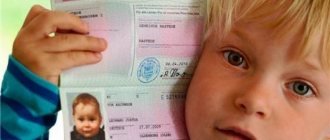New edition of Art. 137 RF IC
1. Adopted children and their offspring in relation to adoptive parents and their relatives, and adoptive parents and their relatives in relation to adopted children and their offspring are equal in personal non-property and property rights and obligations to relatives by origin.
2. Adopted children lose personal non-property and property rights and are released from responsibilities towards their parents (their relatives).
3. When a child is adopted by one person, personal non-property and property rights and obligations can be preserved at the request of the mother, if the adoptive parent is a man, or at the request of the father, if the adoptive parent is a woman.
4. If one of the parents of an adopted child has died, then, at the request of the parents of the deceased parent (grandfather or grandmother of the child), personal non-property and property rights and obligations in relation to the relatives of the deceased parent may be preserved if the interests of the child so require. The right of relatives of a deceased parent to communicate with an adopted child is exercised in accordance with Article 67 of this Code.
5. The preservation of the relationship of the adopted child with one of the parents or with the relatives of the deceased parent is indicated in the court decision on the adoption of the child.
6. The legal consequences of the adoption of a child, provided for in paragraphs 1 and 2 of this article, occur regardless of the entry of the adoptive parents as parents in the birth certificate of this child.
Responsibilities of foster parents
Child education
Placement of a child in a foster family is a legal process; the rights and responsibilities of foster parents are spelled out and regulated by the norms of the RF IC, the Regulations on Foster Family, the Civil Code of the Russian Federation, etc. The
responsibilities of foster parents are:
- in caring for the physical health of the child;
- in organizing the education and leisure of a minor;
- in protecting all the rights and interests of the child;
- timely notification of guardianship authorities about troubles in the family;
- The responsibilities of adoptive parents include providing a timely report to the guardianship authorities on the process of upbringing and the expenditure of funds for the maintenance of children.
In addition to everyday issues, raising a foster child should be based on mutual respect and trust between parents and children.
Caring for the child’s physical health and treatment
Let's take a closer look at the rights and responsibilities of a foster family.
Based on regulations, legal regulation requires foster families to take care of the child’s health.
The health of the child, his comprehensive development, child care, treatment of the child, systematic examination by doctors, following their recommendations and monitoring the child’s condition is the responsibility of the adoptive parent.
Organization of education and leisure
A foster family is the same form of upbringing as raising a child in his own family.
Therefore, the parental and professional functions of a foster family are the same as in a regular one.
One of the important functions is organizing the education of children and getting them educated.
According to paragraph 6 of Article 148.1 of the RF IC, adoptive parents not only have the right to choose a school or kindergarten, but are also obliged to place their child in an educational institution to receive an education.
The foster parent is obliged to monitor the child’s behavior, attendance, studies, attend the educational institution, and have constant contact with the curator, educators, and teachers.
Protection of legal rights and interests
Once in a foster family, a child receives rights and protection.
The responsibility of adoptive parents lies in the fact that they are obliged not only to create the necessary conditions at home, but also to guard the interests of the minor and his legal rights.
From the moment of placement in a foster family until the end of the period of stay in it, the child is completely under the protection of the adoptive parents. Until the age of 10, the interests of the child are taken into account by the guardianship authorities; after 10 years, the child himself can make a decision and give consent to live in a foster family. But it is the adoptive parents who take on the functions of legal representatives of minors.
This applies to all areas of life, including in matters of safety of children’s property. The procedure for disposing of the property of a minor is prescribed in Article 37 of the Civil Code of the Russian Federation. Adoptive parents have the right to make transactions on behalf of minors and can give permission to carry out transactions that the child does not have the right to make.
If it is in the interests of the child to communicate with biological relatives, then the adoptive parents are obliged to allow him to do this. The same applies to communication with potential adoptive parents.
Elimination of unfavorable living and upbringing conditions
The responsibilities of the guardianship authorities include monitoring the living conditions and upbringing of children living in foster families.
During the first three months, home visits are carried out at least once a week. Over the next year - once a month, then - once a quarter.
In this way, the responsibility of the adoptive parent to create favorable conditions is controlled.
According to paragraph 3 of Article 153 of the RF IC, adoptive parents must promptly report to the authorities about all changes occurring in the family, in particular, if unfavorable conditions arise, especially when there is a threat to the life and health of the child. Failure to comply with this requirement will result in administrative or criminal penalties.
Adoptive parents are responsible for harm caused by a child under 18 years of age
Foster parents are responsible for the behavior of children during extracurricular and free time, during summer and seasonal holidays. From the moment they reach adulthood, responsibility falls on the children themselves.
As for administrative and criminal actions, the law sets the age from which the child himself will be punished for committing illegal actions.
In some cases, the child may be placed in specialized institutions, colonies for children. However, due to his age, he cannot pay a fine or incur other types of punishment. In this case, the legal representatives will be punished.
Adopted children receive the rights and responsibilities of their natural children
A child, becoming a member of a new family, also receives corresponding rights and responsibilities. If in a situation with an adoptive parent the status is equal to that of a parent, then the position of an adopted child fully corresponds to the status of a natural child.
The adoptee has some responsibilities:
- obey and respect adoptive parents;
- get secondary education. This means that the minor must complete at least 9 grades of a general education school, and obtaining a further level of education is optional;
- behave in accordance with family rules, as well as demonstrate decent behavior in public places;
- comply with the statutes of educational institutions, etc.
Along with natural children, adopted children similarly have a number of rights:
- communicate with relatives, including biological parents, if this is in the interests of the minor;
- express one's own will;
- protect your interests, etc.
As a result, the adoption process always takes a toll on the lives of everyone involved. After its implementation, they not only manifest themselves in new statuses in relation to each other from the psychological side, but also from the legal side.
Who are adopted children and adoptive parents?
An adoptive parent is an individual who becomes an adoptive parent after the transfer of a child. It undertakes to ensure the child’s moral, mental and physical development. In the Russian Federation, any citizen who has reached the age of majority can become an adoptive parent. The following persons are excluded:
- non-traditional orientation;
- those who have served time for crimes of a sexual nature, murder or other particularly serious crimes;
- those who do not have their own home or permanent residence;
- officially unemployed;
- unable to adopt a child due to health reasons;
- those who previously took part in the program and were deprived of their adoptive parent status;
- deprived of rights to natural children.
Citizens who are unable to independently exercise and acquire rights do not participate in the program. A man and woman who fully meet the requirements of the state, but are not married, do not have the right to adopt the same child. If the adoptive parent is a single person, then the age difference between him and the adoptee must be 16 years.
If several families are fighting for a child, then preference is most often given to close people. Potential parents must undergo legal and psychological-pedagogical specialization.
By law, only minors (under 17 years old) can be adopted. Children over 10 years of age are asked to consent to the procedure. According to statistics for 2021, children under 4 years of age are most often adopted: in this case, the risk of developing addiction problems is unlikely.
In what case do these persons have rights to each other’s inheritance?
Adoption is understood as a legal procedure during which an adult capable citizen takes responsibility for a young child and undertakes to provide him with decent cultural and psycho-emotional development. The fact of adoption is confirmed by a document from the registry office.
Acquired rights:
- adopted children can inherit property after their adoptive parents;
- after the death of the mother or father of the adopted child, maintaining relations with the relatives of the deceased is possible;
- In case of loss of health, the mother and father of the adopted child can take part in the division of the property left after the adopted child.
Adoptive parents or children may be deprived of responsibilities and rights of inheritance. The order of inheritance is built individually depending on the number of natural children born in the family.
In what case does the right to inheritance not apply?
It is impossible for adopted children and adoptive parents to receive part of the property in a number of cases. Most often, the reason for revocation is inappropriate behavior of the adoptive parents (alcohol abuse, physical and mental violence).
Recognition of the heir as unworthy
An heir may be considered unworthy if his claims to the property of the deceased adoptive parent turn out to be unlawful, namely:
- in order to increase the share, actions were taken that violated the rights of other heirs;
- failure to fulfill direct obligations to the adoptive parent.
Grounds serving as a reason for deprivation of inheritance rights:
- unlawful actions through which the inheritance share was reduced or increased (change of job, concealment of income);
- evasion of payment of funds for the maintenance of incapacitated parents, sisters, brothers, grandfathers and other relatives;
- forgery, destruction or concealment of a will;
- forcing the remaining heirs to give up their share;
- deliberate physical destruction (murder) of the testator or heirs;
- exerting physical influence on the testator;
- blackmail or persecution of the testator and/or heirs;
- misleading the testator with the aim of influencing him when drawing up his will.
Cancellation of adoption
The order of inheritance, as well as its cancellation, between adopted children and adoptive parents is determined in court. Such cases are considered with the participation of representatives of the guardianship authorities. The grounds for cancellation of adoption are conditionally divided into 2 categories:
- indisputable;
- legal.
- Systematic use of alcoholic beverages and drugs by parents. The behavior of adoptive parents is contrary to the interests of the adoptee. An indisputable basis serves as a reason for depriving parental rights to natural children.
- Child abuse. Foster parents who regularly cause physical harm to a child will be deprived of their rights.
- Abuse of parental rights. Cancellation of adoption is advisable if the parents do not fulfill their responsibilities.
A legal reason for canceling an adoption may be a sharp deterioration in the living conditions of the adoptive parents. Representatives of guardianship authorities are required to regularly inspect families where adopted children live.
Definition and signs of illegal adoption
Many people are not given the opportunity to have their own baby, and for such people there is the opportunity to take a foster child into the family. But not everyone can raise someone else's child. Conscious, healthy and sufficiently wealthy citizens can take on such responsibility. To legally adopt a child, you must have a number of characteristics, namely:
- to be capable;
- not be deprived of parental rights and fulfill their responsibilities for caring for other children, if any;
- have good health (there should be no serious diseases from a special list approved by the Government of the Russian Federation);
- have a sufficient level of income and normal living conditions;
- have no criminal record;
- the age difference between the parents and the intended adopted child should not be less than 16 years.
So, what is meant by illegal adoption? This is a procedure for transferring a child to be raised by persons who do not meet the characteristics of adoptive parents. That is, according to the law, these people cannot take care of a child from an orphanage.
You can adopt a minor even if your mother and father are still alive, if they are unable to take care of him properly. However, this procedure requires their consent. If it is not there, then adoption is impossible. Sometimes, for selfish purposes, guardianship officials can transfer a child to a family with living parents without their consent. This crime is also interpreted as illegal adoption.
See also:
Features of leave to care for an adopted child
The culprits of the act are most often the very people who transferred the child to an unsuitable family. If the adoptive parents do not meet all the requirements for adoptive parents, then the baby may not receive proper upbringing, and his living conditions will not be conducive to normal physical and mental development. The qualifying elements of the crime are specified in Art. 154 of the Criminal Code of the Russian Federation:
- repeated actions of a similar nature;
- actions taken to obtain benefit.
In other cases, illegal adoption is considered an administrative offense and is not subject to criminal liability.
In any case, sending a child to a family, knowing that he will not be happy there, ruining the life and psyche of a minor citizen is a punishable act. How exactly can those who committed it be punished?
Guardians' rights
Clause 3 of Article 153 of the RF IC defines the rights of adoptive parents to raise children:
- carry out the educational process;
- choose the methods of upbringing yourself and in accordance with the laws and interests of children;
- foster family status allows you to choose any educational institution;
- return the child from people who are illegally detaining him;
- make transactions with property, but only with the permission of the guardianship authorities and in the interests of the child.
As was said earlier, adoptive parents should not interfere with communication with relatives, his parents.
An exception is if such communication violates the rights of the child and does not correspond to his interests.
At the same time, there are cases when, after such communication, relatives do not allow children to return to foster families. Therefore, the adoptive family has the right to file a lawsuit to resolve the issue of returning the child to the foster family.
Legislation
Children left without care have the opportunity to find a family as a result of adoption by their adoptive parents. This form of placement of children is described in detail in Art. 124 of the Family Code.
In Art. 137 of the Family Code provides for certain legal consequences that occur for parents and children from the moment the adoption is formalized.
What can a minor expect?
After adoption, the spouses or single citizen must create appropriate conditions for the little ward to live, study, and develop. The baby must be provided with living space, a place to sleep, the necessary treatment, food, and clothing. If citizens ignore the requirements of their updated status, this may cause it to be revoked.
The Investigative Committee regulates the procedure for revoking the powers of the violating adoptive parent. The consequence of the cancellation is the loss of legal connection with the adoptive parent and the restoration of the rights of blood relatives. However, the court has the right to impose on the former patron the obligation to pay alimony for the minor with whom the ties have been severed.
Forms of transferring a child to a family for upbringing
Regardless of what form of transfer of a child to a family is chosen, the law establishes several mandatory rules:
- persons who are going to take a child into care must be checked to ensure that they have the appropriate conditions for this;
- children who are already 10 years old are asked for their consent to be transferred to a family;
- the living conditions of children, as well as relations with new parents or guardians, are necessarily checked by authorized bodies;
- According to the law, it is advisable to transfer brothers and sisters to the same family without dividing them.
Adoption
During adoption, the same legal relationships are established between the child and the host family, as well as all their relatives, as in the case of consanguinity. And the basis for this is precisely the court decision. Children under 18 years of age for whom there is no parental care are eligible for adoption. It can occur for various reasons: voluntary refusal, death, incapacity, forced deprivation of parental rights and much more.
Legislatively, the adoption process is regulated by Ch. 19 of the Family Code of the Russian Federation. Full legal family relationships between the child and his new family arise within 30 days after the court makes the appropriate decision. During these 30 days, the protesting party has the right to appeal. The law allows adoption by both couples and single citizens. The requirements are the same in both cases. The adoption cancellation process is also allowed. It is appointed by the court due to unworthy treatment of the child (violence, poor living conditions, unworthy or cruel treatment of the child, etc.).
If you are planning to adopt a child, you must contact the appropriate guardianship authority. You will first need to undergo an appropriate psychological test.
Establishment of guardianship and trusteeship
Guardianship or guardianship involves child care, maintenance, education, protection of his rights, and so on. According to the law, this type of relationship does not provide for the emergence of family ties between the child and the guardian.
Guardianship is established over a child under 14 years of age, and guardianship at 14-18 years of age (in accordance with Federal Law No. 159-FZ of December 31, 2014). This decision is made by the guardianship authorities. In theory, the initiative to transfer a child to a family under guardianship should be initiated by the guardianship authorities. But in practice, everything happens the other way around: those who wish to formalize guardianship submit an application for their consent to the local guardianship authority, after which the leadership of the self-government bodies issues a special order and transfers the child to a foster family.
All issues of guardianship relationships are regulated by Chapter 20 of the Family Code of the Russian Federation. Adults with legal capacity who are not addicted to alcohol or drugs, who have not previously been convicted, who have undergone special training and who have not previously been deprived of parental rights can act as guardians. Preference in choosing guardians is given to blood relatives of children. Guardians (trustees) undertake to live with the child, support and educate him, and protect his legal and physical rights. In addition, persons who have formalized guardianship can and must obtain all necessary benefits even with living parents (child support).
Adoptive family
Children who have lost parental care are transferred to a foster family. To do this, it is necessary to conclude an appropriate agreement between the parents and the guardianship authority. It is concluded for a certain period, but can be terminated early either by the guardianship authority (if there is no proper care for the child) or by the adoptive parents themselves for a good reason (misunderstanding with the child, illness, etc.).
Chapter 21 of the Family Code of the Russian Federation regulates the relationship between the child and the adoptive family. The right of inheritance and the need to pay alimony for adopted children do not arise. The agreement concluded between the foster family and the guardianship authorities also contains a clause on financial compensation for the maintenance of the child. The amount of financial assistance is regulated depending on the region of residence. Adoptive parents have the same rights and obligations as guardians. According to statistics, in Russian families the total number of children (natural and adopted) rarely exceeds 8 people.
Article 137 of the RF IC. Legal consequences of adopting a child
An adopted child must be as close as possible in the legal sense to the adoptive parent’s natural children.
Full equality of an adopted child in personal and property rights and obligations with the adoptive parent’s natural children occurs on the basis of an adoption carried out in accordance with the requirements of the law. The act of adoption establishes for both the adoptive parent (and his relatives) and the adopted child (and his offspring) the same rights and obligations as those provided for by law in relation to parents and children related by blood.
Adoptive parents are given parental rights and responsibilities that are lost to the child’s natural parents. The legal requirement obliging parents to raise their children and take care of their health, physical, mental, spiritual and moral development fully applies to adoptive parents. They are obliged to financially support their adopted children. In case of malicious evasion of payment of alimony, adoptive parents may be brought to criminal liability. Adopted children, in turn, are obliged to take care of their adoptive parents and provide them with assistance. The maintenance of disabled adoptive parents in need of assistance is the responsibility of their adult able-bodied adopted children. In this case, the fact that adoption is not a secret for the adopted person or the adoptive parents are not registered as parents has no legal significance.
As a result of adoption, the adopted person, as well as the adoptive parent (and his relatives), acquire not only the rights and obligations arising from family relationships, but also all those rights and obligations that are provided for by the norms of other branches of legislation, one of the grounds for the emergence of which is the fact of kinship; in inheritance by law, adopted persons are relative to adoptive parents, and adoptive parents are heirs of the first priority in relation to adopted children. Adoptive parents, being the legal representatives of minor adopted children, make civil transactions on behalf of children under 14 years of age (minors), or give consent to transactions by children aged 14 to 18 years.
The rights and obligations of adoptive parents to dispose of children's property are determined in accordance with the Civil Code of the Russian Federation. Adoptive parents are responsible for damage caused by a minor child under 14 years of age, unless they prove that the damage was not their fault, and also bear additional responsibility for damage caused by children aged 14 to 18 years, if the children have no income or other property sufficient to compensate for damage.
An adopted child may be moved into the adoptive parent’s residential premises, regardless of the size of the living space he occupies and without the consent of other family members permanently residing with the adoptive parent.
The law prohibits marriages between an adopted child and an adoptive parent. Other family ties created as a result of adoption are not an obstacle to marriage. Thus, a marriage can be concluded between an adopted child and the adoptive parent’s own daughter.
Despite the complete cessation of legal relations between the adopted person and his blood relatives, the very fact of kinship, and therefore biological obstacles to marriage, remain. Therefore, despite adoption, the fact of consanguinity remains an obstacle to marriage between close relatives.
Legal relations between the adopted child and the parents cease from the moment of adoption, regardless of whether the child is adopted by the spouses jointly or by one of them. However, when a child is adopted by one person, the law provides for possible exceptions to the general rule. Thus, the rights and responsibilities of the mother (at her request) can be preserved if the adoptive parent is a man, or the father if the adoptive parent is a woman, both in relation to the child himself and in relation to his relatives. This situation usually occurs when a child is adopted by a stepfather or stepmother. In these cases, the mother or father retains all the rights and responsibilities of a parent.
A certain range of rights of a child is preserved even during adoption. Reservation of rights for a parent of a gender other than the adoptive parent is allowed not only in cases where the adoptive parent marries the mother (father) of the child, but also in other cases when this does not contradict the interests of the child. For example, a child is adopted by an uncle - the brother of a deceased father or a single woman, and the adoptive parent does not object to maintaining a legal connection with the father (mother) of the child, etc.
The Family Code allows for the possibility of preserving the legal relations of an adopted child with other close relatives. At the request of the parents of the deceased father (mother) of the child, i.e. grandparents of the child, the legal relationship between them and their grandson (granddaughter) can be preserved. Such a decision is possible even in the absence of the consent of the adoptive parent. The defining moment is to ensure the interests of the adopted child. For example, a court may decide to preserve a child's legal connection with a grandparent in cases where the child knows them and is attached to them, and cessation of contact with them could cause him severe psychological trauma.
More on the topic “Adoption: the path to a child”:
How we became bad parents
It started... It’s a little early, but these are the realities. Almost 5 years ago we welcomed three orphans, boys, and preschool-age brothers into our family. The eldest was 5, the youngest one and a half years old. After a short time, it became clear that the children were adapting very poorly to society. They cannot follow established rules, follow instructions from adults, work in classes, or respond adequately to comments. The visual effect that children are outwardly very beautiful, well-groomed, well-groomed, well-developed and intelligent - causes others...
relatives of the child
Adopt? The child doesn’t really know his brother, he didn’t live with him, he didn’t visit him at home. And now I decided to take it! And also a question about the grandfather, should a child communicate with him? Adoption: the path to a child.
moving from Siberia to Krasnodar region with adopted children
These payments are paid by the Moscow government or the Moscow Region government, respectively, regardless of in which region of the Russian Federation the adopted child and his adoptive parent live. Adoption: the path to a child.
The topic of adoption of children by foreigners comes up again.
So, the topic of adoption of children by foreigners comes up again. The State Duma ratified an agreement with Spain on the adoption of children. I have repeatedly expressed my opinion on this matter previously, and today I believe in the same way that it is necessary to completely ban foreign adoption. I have already explained many times why I am against this practice. And I’m ready to explain again and again. Firstly, I don’t understand at all how it is possible to send a Russian child to another country, to a cultural environment foreign to him? Even…
The child was returned to his family from foster care
The meeting of the Morozovs at the station On August 7, another case of family restoration, which had been dealt with by the Chelyabinsk and Novosibirsk regional branches of the Parental All-Russian Resistance (RVS) for six months, ended. Svetlana, a resident of one of the villages of the Uvelsky district of the Chelyabinsk region, contacted the RVS in February. The year before last, life forced Svetlana to leave with her son for the Novosibirsk region, where she became the victim of a feigned combination of regional guardianship authorities and unknown...
Is it possible to create a family orphanage?
Question about foster families.
Adoption. Discussion of issues of adoption, forms of placing children in families, raising adopted children, interaction with guardianship, training at school for adoptive parents. Adoption: the path to a child.
Relatives
One day he was found out of his care and informed that his relative (I don’t know who he is related to) on the other side of the country abandoned the child and future adoptive parents were found for the girl. Adoption: the path to a child.
adoption tests
Adoption: the path to a child. The guardianship authorities exercise annual control over the adoptive family for at least a period of time. The parties to the agreement representing the state organize training, recreation and...
Training for adoptive parents has become mandatory
Adoption: the path to a child. The guardianship authorities exercise annual control over the adoptive family for at least a period of time. The parties to the agreement representing the state organize training, recreation and...
Tell me if the child does not have status
Adoption. Discussion of issues of adoption, forms of placing children in families, raising adopted children, interaction with guardianship, training at school for adoptive parents. Adoption: the path to a child.
Girls, has anyone taken custody of a rental property?
You can return to housing at the place of registration at any time, incl. and with the police, and an adopted child is registered according to your application, no one’s consent is needed - just like with a natural one. Adoption: the path to a child.
Adoptive family
What is this?
The form of raising a child (children) in a family (at home) with a foster parent-educator. Such a family replaces the child’s stay in an orphanage or shelter with home education and is created on the basis of an agreement between the adoptive parent (parents) and the guardianship authorities. Usually, children who cannot be transferred for adoption or guardianship are transferred to a foster family, for example, to raise 2-3 or more children of brothers and sisters in one family. The period of placement of a child in such a family is determined by the contract and may vary. Foster families can raise from one to 8 children.
Rights of the parties
In relation to the child, the adoptive parents are his guardians; for their “care work” for the child, they receive the amount assigned by the state; the adoptive parent is given credit for their work experience. The state pays a monthly payment for the maintenance of the child, provides benefits for transport services, housing, and assists in organizing education, recreation and treatment for the ward. Targeted funds are paid for repairs, purchase of furniture, and other benefits are provided in accordance with regional legislation. When an adopted child turns 18, he is allocated housing if he does not have one. The foster parent-educator is obliged to constantly report to the guardianship authorities for the expenditure of funds allocated for the child.
Peculiarities
It is possible to transfer to a family children who do not have adoption status, children removed from large families or children of convicted parents and, otherwise, doomed to live in an orphanage. Requirements for candidates are the same as for guardianship. However, this type of relationship is more difficult to formalize because An agreement on the placement of a child in foster care (an agreement on the provision of paid services) is required. There may also be difficulties when registering a child living in another area or city because... payments to the foster family are made from the local budget. Contacts of the child with blood relatives are not mandatory, but possible.
Stages of the adoption procedure
The first stage is collecting documentation and submitting an application to the guardianship and trusteeship authority
Persons who have expressed a desire to become parents must fill out a corresponding application with the guardianship authority with a request to make an opinion on the possibility of them adopting a child in an orphanage.
The following documents are required for adoption:
- autobiography form (full name, address, contacts, citizenship);
- passport – original and copy;
- certificate of financial security: certificates from places of work (position, salary amount indicated), income statement (copy);
- personal account of utility services, a copy (indicating the absence of debt), an extract from the house register, confirmation of ownership of the living space;
- certificate of no criminal record (updated certificate, requested in advance);
- the result of a medical examination (valid for 3 months);
- marriage certificate, copy.
The guardianship authority (CCA) sends a special commission to inspect the living space for compliance with the required level. Based on the results of the inspection, a report is drawn up.
The commission's conclusion is issued within 15 working days. If the decision is positive, applicants are registered as candidates for possible adoption of a child.
In case of refusal, 5 days after signing the conclusion, the applicant receives a notification along with the submitted documents, an explanation of the reasons for the negative decision and the procedure for appealing it.
Stage two – searching for a child for adoption
Having registered for registration, PLO employees give candidates access to the state database of children with a referral to an orphanage to visit them.
The issued referral is valid for 10 days and gives the right to visit one child. The document can be extended if there is a good reason: business trip or illness.
In some situations, potential parents cannot make a choice. In this case, they have the right to contact the PLOs supervising other districts.
Based on the results of the visit, candidates must inform the operator of the state data bank about children in writing about the decision made.
Before adoption, candidates have the right:
- study all available information about the child: status of parents, presence of relatives;
- conduct a medical examination of the child being adopted (with the participation of a representative of the child care institution)
Candidates are required to:
- getting to know the child;
- inspection of documents relating to the adoptee;
- written confirmation of familiarization with the conclusion of a medical examination of the child’s health.
The search for a child is not limited to the information contained in the database. If necessary, a citizen can submit an application for further search for the child. The operator is obliged to send monthly notifications to candidates about new children's profiles in the state database.
If the candidate has not responded to the repeated notification about the appearance of new children's profiles, the search for him is resumed after a written application.
The third stage is the consideration of the case in court.
The court hearing is held according to the territorial location of the child’s place of stay in the child care institution. The court hearing is initiated by the candidate adoptive parent based on an application.
The application must indicate:
- contact details of the adoptive parents, full name and residential address;
- details of the child being adopted: full name, date of birth, address, information about all known relatives and parents;
- documentary substantiation of the circumstances for which the adoptive parents submit the request;
- request to change the name, place and date of birth of the child being adopted, registration of the adoptive parents in the registry office as the child’s parents.
How does adoption work in court?
Having received permission from the guardianship authorities, you need to apply to the district court at the child’s place of residence for adoption:
- Collect documents, draw up a statement of claim, submit to the judicial authority.
- Participate in court hearings. According to Art. 273 of the Code of Civil Procedure of the Russian Federation, they are held behind closed doors in the presence of representatives of the guardianship authorities, the prosecutor and the adoptee over 14 years of age.
- Get a solution.
The decision comes into force in 10 days. The case is considered within 2 months, but if there are no problems, the decision is made in 1-2 meetings.
How to make an application?
The application must comply with the rules of Art. 270 and 131 Code of Civil Procedure of the Russian Federation.
It reflects the following:
- Full name, place of residence of the adoptive parents;
- Full name, date of birth of the adoptee, place of residence, information about parents, brothers, sisters;
- The circumstances on the basis of which the adoption must be approved;
- Request to change your full name child, making changes to birth certificates, entering information about adoptive parents into acts.
At the end, a list of attached documents is indicated and a signature is placed.
Sample application to the court for the adoption of a child: alt: Application to the court for adoption
Documentation
Based on Art. 271 of the Code of Civil Procedure of the Russian Federation, the same documents are attached to the application as for the guardianship authorities, plus permission from them. Everything is provided in duplicate.
Additionally, you must provide the following depending on the situation:
| Adoption by stepfather or stepmother | Consent to adoption from a parent who does not live with the child, but has not been deprived of parental rights |
| Adoption by small northern peoples leading a semi-nomadic or nomadic lifestyle | Documents from the administration confirming such a lifestyle |
| Adoption by foreigners or stateless persons | Conclusion of the competent authority on living conditions, on the possibility of becoming adoptive parents; Permit for entry of an adopted child into a foreign country; Consent of a child over 10 years old |
Note! Documents from foreign citizens must be legalized on the territory of the Russian Federation. After legalization, a translation into Russian is made, notarization is required
What to do after receiving a court decision?
After the court decision has entered into legal force, you must contact the registry office at the place where the decision was made to obtain an adoption certificate and a new birth certificate.
What the procedure looks like step by step:
- Get an extract from the court decision and submit it to the registry office. It is not necessary to fill out an application: according to Art. 41 Federal Law No. 143-FZ dated November 15, 1997, the appeal can be expressed orally.
- Receive certificates on the day of application. If the application is submitted through “State Services” - on the selected date of visit.
To register an adoption you will need the following documents:
- Judgment;
- Passports of adoptive parents;
- Children's old birth certificate.
If a legal representative acts on behalf of the adoptive parent, a power of attorney will be required.
Adoption
What is this?
Adoption of a child into a family as a blood child. The child becomes a relative - a daughter/son with all the ensuing rights and responsibilities. Adoption is the preferred form of placement. For parents, this is the highest degree of responsibility for the fate of the child and his full development. Payments upon adoption are the same as upon the birth of a natural child.
Rights of the parties
As a full-fledged member of the family, the child receives all inheritance rights, including upon leaving the minor age. Parents have the opportunity to assign their child their last name, change the first name, patronymic and, in some cases, the date of birth (but for no more than three months).
Peculiarities
It takes the longest to formalize adoption - the state is very demanding of adoptive parents, placing the most stringent requirements on candidates for adoptive parents, their financial situation, earnings, housing compared to other forms of placement. The adoption is approved by a civil court. At the same time, the state does not provide any assistance after adoption, with the exception of providing postnatal leave and payments in connection with the birth of a child in the event that an infant under 3 months is adopted. Guardianship authorities carry out annual monitoring of the adoptive family for at least three years after adoption. It must be remembered that not every child deprived of parental care can be adopted. In particular, it is mandatory for the blood parents to have a written refusal of their child.
Adoption allows a child to feel like a full-fledged member of the family!
Adoption can be issued for one person or for spouses. Moreover, if the spouses are in a civil marriage, then the common-law spouse of the adoptive parent does not receive any rights and obligations in relation to the child. In Russia, the secrecy of adoption is provided for and, if necessary, you can hide from others that the child has been adopted.
Adopted children are deprived of property rights and responsibilities to their biological parents
The rules for relationships with parents by birth partly follow from Article 137 of the RF IC.
It says that children, after being adopted, lose property and personal ties with their mother and father.
This actually means that from the moment the child enters a new family, parents are not obliged to support, provide, care, etc.
At the same time, children are released from legal obligations, including supporting elderly parents, etc. All rights and obligations of the adopted child are directed to the adoptive parent, and not to the natural father or mother. The only exception may be cases where communication is maintained, but only in accordance with a court decision and following the interests of the minor.







